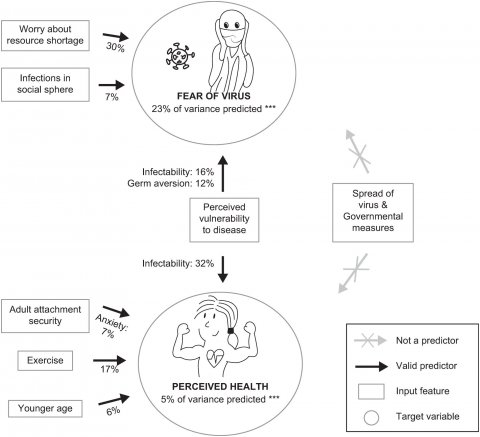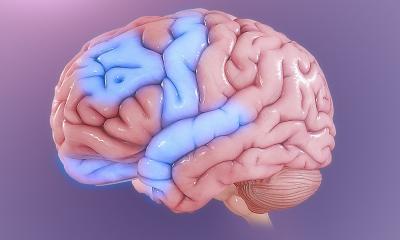News • How our brain handles the pandemic
Fear of Covid-19: The psychology of the pandemic
During pandemics, protective behaviors need to be motivated by effective communication. A critical factor in understanding a population’s response to such a threat is the fear it elicits, since fear both contributes to motivating protective responses, but can also lead to panic-driven behaviors.
Furthermore, lockdown measures affect well-being, making it important to identify protective factors that help to maintain high perceived levels of health during restrictions. An international team of researchers led by scientists from the University of Vienna has now identified psychological predictors of fear and health during the lockdowns. The result of the study, published in PLOS ONE: Individual psychological variables have a much better predictive power than environmental variables.

Image source: Eder et al., PLOS ONE 2021 (CC BY 4.0)
The current publication aims to identify predictors of fear and perceived health during stay-at-home orders in response to the Covid-19 pandemic. "This way we can predict how different people and populations will react to external threats and restrictions," explains Stephanie Eder from the Faculty of Psychology. Researchers from the University of Vienna in collaboration with scientists from the University of Wroclaw (PL), University of Barcelona (ESP), Charles University and Jan Evangelista Purkyne University (CZ) have investigated 533 participants during the 'first wave' of the COVID-19 pandemic in Europe.
Utilizing machine-learning models, they identified psychological predictors of fear and health during the lockdowns. Fear can be predicted very well when worries about shortages in supply, perceived infectability to diseases in general, germ aversion, and infections in the immediate social sphere are taken into account. Predictors of perceived health include higher perceived infectability to diseases in general, attachment security, physical activity and younger age; suggesting that older populations with high perceived infectability and insecure attachment may be most vulnerable during these uncertain times.
Interestingly, environmental variables such as the local severity of lockdown restrictions and mortality had no predictive value for either of the target variables. "We could show the value of 'micro-level', psychological factors over macro-scale environmental conditions when predicting a population's response to a crisis and when designing behavioral interventions for specific target groups.", says Eder.
Other aspects of this pandemic have been investigated as part of the same project and can be accessed over the Open Science Framework: https://osf.io/db4px/
Source: University of Vienna
15.03.2021











